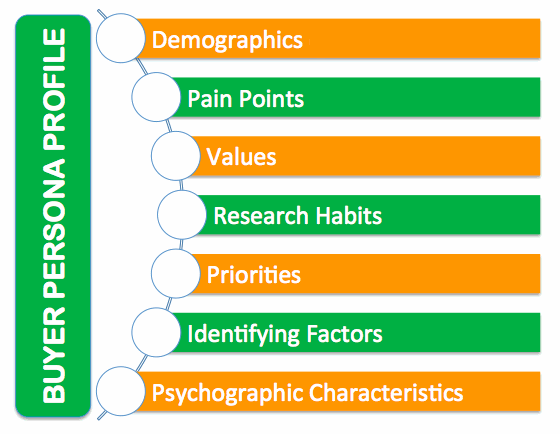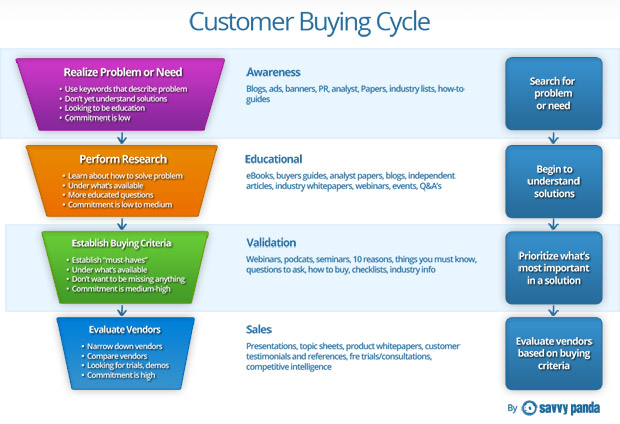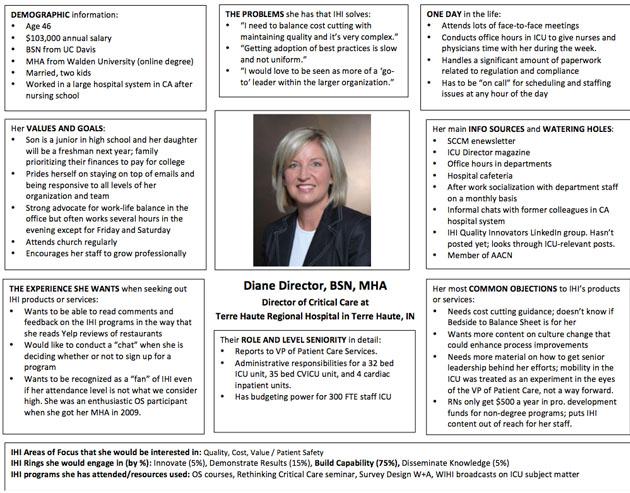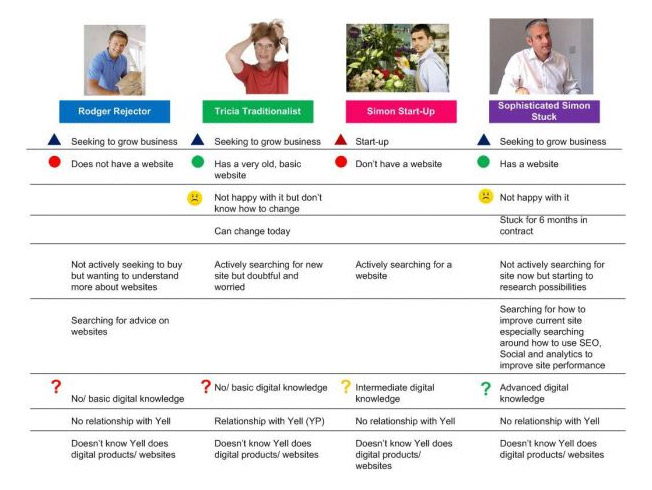In the last article we talked about the importance of Storytelling in image building and brand positioning, and also to strengthen relationships with our customers/audience (among other things obviously). But … we skipped something FUNDAMENTAL: getting to know and defining our Buyer Persona before actually producing any content.

It’s essential to understand that the buyer person (BP) gives us a great backdrop and lots of insight that’ll help align the efforts of different areas or aspects of our business focus. It’ll also add coherence to decisions related to product development, marketing strategies, communication operations, sales messages, brand message.
Now do you get why its so important?

What we’re saying is: besides knowing how to “tell” the brand in respect to the characteristics and nature of each social network, or perhaps knowing what size a picture, a video, a cover should have, or even the time of publication, it’s really important to know if WHAT we’re offering as a solution, selling, or communicating, and if HOW we’re doing it FITS the needs, the desires, and the ideals of the people who we’d like to have as customers.
THIS is the step that we skipped before. It’s the same one that many beginning marketers, entrepreneurs, and people who decide to start their own projects also forget (myself included, that’s why I’m blogging about it!).
I imagine that many of you have sat at the computer thinking:

Why is my ROI so low? Why is there so little interaction? Why isn’t my content on social networks working? Why aren’t my promotion actions that attractive? Why are there so few conversions, Why, Why, Why? … FRUSTRATION.

We spend hours and hours reviewing our marketing/social media strategy. We ask ourselves over and over if the tactics and resources we’ve chosen are right or not. But … Have you ever asked yourself the following questions about your customers…?:
For example:
Is this how our customers would like us to approach them? Is this how our customers best process information about our product? Are the topics we’re using the ones that’ll help persuade and generate positioning in their minds? Are the features of my product that I’m highlighting those that really appeal to my customers and represent a solution for them?

Defining the buyer persona, “consumer” persona, marketing persona, user persona (there are even more synonyms) is actually the most important thing to do before planning a strategy and unfortunately the most forgotten. Perhaps, this is why the efforts in investment, marketing, communication, etc . . . . , always seem like they’re never enough.
At least that’s the way it seems, right?

The Buyer Persona is a tool that works like a hub and turning point and that’ll help guide future decisions. If we get deep enough into this task, we’ll obtain an INVALUABLE competitive advantage.


Before continuing with the article, it’s important for me to make it clear that designing buyer personas (BP) is actually quite complex. It’s usually a task for specialists who have formal knowledge in guiding research, conducting interviews, questionnaires and processing all the information collected in order to obtain a finished, comprehensive and successful Buyer Persona Profile. Obviously, this involves a lot of money, and not everyone has a margin within their budget to put a team of professionals to work on this. So, here at Postcron, we’re offering a little guidance so that at least you can put together a sketch of your Buyer Persona Profile, and therefore get a successful start for the strategic steps that follow.
Now, Let’s get STARTED!
1- What’s Buyer Persona and why is it important?
I’m gonna share Tony Zambito‘s definitionwith you, the father and prophet of this tool:
Buyer personas are research-based archetypal (modeled) representations of who buyers are, what they are trying to accomplish, what goals drive their behavior, how they think, how they buy, and why they make buying decisions. (Today, I now include where they buy as well as when buyers decide to buy.)
His literature also indicates that while defining and designing Buyer Personas, between 3-5 profiles of buyers should be detected. So, the challenge is no longer settling on one, but actually several.
1.1 What are the benefits of developing Buyer Personas?
I like how this article presents the advantages, let’s take a look at the most important ones:
- Increase return on investment (ROI) using strategic marketing activities: investments in marketing activities become profitable because now they’re based on behaviors which are studied and obtained from the BP.
- Facilitate the planning and design objectives: the BP provides information and context needed to design marketing messages, sales messages, and content sharing.
- It enables us to develop a strong brand message and even more the right one: knowing to whom, how to, and what to transmit, allows the message to not be lost or diluted by an audience that’s not who we want, and from who won’t gain anything in the end.
- Sales….
Similarly, the development of BP lets us know what the triggers are that activate or touch our audience, in order to later engage them in a serious purchasing process.
- In social media…
Having detailed knowledge of each BP profile is critical because it simplifies decision-making related to basic aspects of a content strategy. With a deep understanding of each Buyer Persona we can specify:
1 – What topics to develop
2 – Which social media channels to utilize in order to interact with the BP
3 – What formats to develop in order to better assimilate our content
4 – What language to use for each BP (This is essential)
5 – What the best times for each BP are
6 – Where they spend their hours online reading: Ideal for where to do guest blogging for example.
7 – Which devices to use: desktop, smartphones, tablets, etc. . . . You need to know if it’s worth making an entire digital strategy, and whether to include mobile content or not.
TIP 1:
If you want, you can start now and download THIS spreadsheet, which is what we use here at Postcron to quickly define and organize these aspects. It’s nothing complex. In Postcron we like simple, convenient, and time-saving.

2- How do I design a Buyer Persona Profile?
Well, this topic is kinda touchy, because as we said, in order to do it professionally, we’d have to hire a specialist. However, as many of us can’t do this, what I propose is a MUCH simpler alternative. Use a checklist while completing the buyer persona profile so that you don’t skip any of the important aspects.

Normally, the collection of qualitative information related to the buyer and buying behavior is done through interviews and questionnaires. Ideally, go to the source, and the source is our customer. You have to talk to them.
Basically, the purpose of the questions you’ll ask, is that the answers will allow us to address the following concerns that everyone, regardless of company size, has:
a- What’s the best way to reach and communicate with our customers?
b- How do we attract and retain their interest?
c- How can we help and add value in their lives?
d- How can we influence their purchase-making decisions?
2.1 – STEPS
One: determine how many consumers profiles the company has
For this part, it’s best to sit with people from the business, those involved in the project, and/or those who have contact with clients, customers, and subscribers. Thus, among all of you, it’ll be possible to identify the most common and main profiles corresponding to the majority of the consumers that the company has.
Two: Creation. Name and complete demographic data
We suggest that you assign a name and picture of the ideal consumer chosen to represent each buyer persona. The goal is to humanize this resource the most you can, even if the data isn’t super accurate:
Name:
Age:
Geographic Location
Civil Status:
Family Formation:
Education:
Labor Condition
Job title or Role:
Annual revenue:
TIP 2:
Use analytical tools from your website, Google and social networks.
Take advantage of these resources in order to find out gender, age, and location. Analyze where the most customers are. Examine databases of newsletters, use social networks, and study up on your customers.
Be sure to review these help guidelines by Google that indicate step by step how to get these reports of your audience/public:
- Information you can get with these reports: click here
- How to enable the report: click here
- FAQ and step by step to configure the various reports configure the various reports of “Public” in Google
Three: Deepen qualitative data for each buyer persona
Basically these would be the aspects to develop:

TIP 3:
Use a spreadsheet with questions.
Do you want to start now?
Download the following check list with more than 75 questions that’ll help deepen your knowledge of your customers and enhance the profile of the BP. Several must be adapted in order to fit the reality of your product or company, but it’s an excellent resource that’ll help shape your Buyer Personas. The best part is that it allows you to start on this task right now, without having to think about what to ask or how to design the questionnaire. Remember that the idea is not to invent or deduce the answers. Although time consuming, for the sake of your future strategy, consult the true sources of information: your own customers.

In addition, this Kissmetrics article proposed a development of BP based on data obtained from SEO reports. In the next tip, you’ll find out how to do it.
3- Buying Cycle + Buying Persona + Content Strategy

2 – Consideration: finding solutions, relative information, and options
3 – Purchase.
Checkout the following graphic made by Savvy Panda, which develops the “Buyer Journey” and how it integrates it into Inbound Marketing in each of the buying cycle steps.

TIP 4: SEO
Use the information provided by Google Analytics tools in order to analyze the SEO information. Use it to understand how your customers look for solutions, find your product, and finally approach your brand. Also, you can use it to find out which devices they use to access that information, and what their preferred format is. All this information can be obtained from the Google Analytics SEO reports.
How?
– Download all the keywords and phrases that your customers use: check out these guidelines from Google on how to access this information (Traffic Sources > Search Engine Optimization.)
– In this link, you’ll get a detailed description of what you get in each SEO report, and thus determine what information you can take advantage of for each. (This other link might also help).
– Finally, from reading this article you’ll have a better understanding about what techniques are recommended for analyzing the above information.
Before concluding:
Now that you have your Buyer Personas, and you know what they need, and how to convey the message of your brand and product …
Are you sure you know exactly what the goals of your content strategy are?
If not, here’s just one more tip to help you finish completing this task:
TIP 5: Select which goal from the following list needs attention today:
- Create brand awareness and position the name of a company
- Increase the potential customer base
- Increase the number of conversions
- Sales Performance
- Establish a debate about a product, issue or certain subject
- Demonstrate professionalism, experience in the industry, in a business, or on a team in relation to a particular topic.
- Become a reference and authoritative voice in a particular market.
- Increase profits, sales, and yield.
In conclusion:
As we said earlier, the importance of buyer persona lies in its power to penetrate and align the different areas of the company. Knowing the profile of your ideal buyer, their shortcomings, their dreams, their objections, what makes them happy, etc…will enable better product development, better sales strategy, better adjustment of the brand message and product in relation to sensitive issues, and also for us to recognize our customers’ emotional triggers. Moreover, it also allows us to create and guide an accurate content strategy that’ll accompany and complement each of these actions. BP enables us to select the formats, topics, words, channels, etc.. that would be most suitable to use in every stage of the purchase, according to each profile or buyer persona.
So, now that you have everything you need…..Let’s make some money! …as the Wolf of Wall Street would say.


